|
|
|
Sort Order |
|
|
|
Items / Page
|
|
|
|
|
|
|
| Srl | Item |
| 1 |
ID:
151967
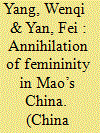

|
|
|
|
|
| Summary/Abstract |
During the Chinese Cultural Revolution, Mao’s famous political slogan ‘The times have changed, men and women are the same’ (时代不同了, 男女都一样) asserted that men and women were equal in political consciousness and physical strength. However, the slogan’s seeming emphasis on gender equality misconstrued the concepts of equality and sameness. In-depth interviews with former ‘sent-down’ youth illustrate how state rhetoric appropriated a discourse of women’s equality to silence women and depoliticize gender as a political category. For urban sent-down youth, gender inequality was absent from public discourse, and conflict between the sexes was concealed by a state discourse that constructed class struggle as paramount. Gender as a category was credited with solely political and pragmatic meaning and was utilized as a means for the communist government to achieve its own political and cultural utopia.
|
|
|
|
|
|
|
|
|
|
|
|
|
|
|
|
| 2 |
ID:
096273
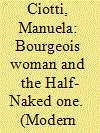

|
|
|
|
|
| Publication |
2010.
|
| Summary/Abstract |
This paper explores the interplay between development, identity politics and middle-class aspirations amongst low-caste Chamar women in rural north India. It argues that this interplay has reinvigorated notions of women's domesticity, education and modern conjugality as they emerged in the reforms and 'modernising' efforts of sections of Indian society, since the nineteenth century, in their encounter with the colonial 'civilising mission'. It will show how the long-term effects of this 'legacy', through its reconfiguration and appropriation by members from a low caste, have affected a historically marginalised community in their pursuit of middle-class aspirations. In addition to the criticality of Indian women and their gender roles as 'sites' where nation and community transformations are symbolically and practically negotiated, scholars of South Asia have also highlighted the separation between historical and anthropological discourses on women. This paper brings these discourses together and addresses this separation by showing that Chamar appropriation of the 'modernising' agenda has initiated a dual process. On the one hand, a minority of women have embarked on an embourgeoisement trajectory predicated on education, 'modern motherhood' and aspirations to white collar employment, and on the other hand, underprivileged women (with their 'unfit' personas) have become increasingly vulnerable to stigmatisation as a result of being in 'menial labour'. It is further argued that dialectic study of the 'two [groups of] Chamar women' will provide an insightful lens through which inner conflicts within low-caste communities in contemporary India may be understood, and suggests that there are contradictory trends concerning women, their development prospects, and their membership within the nation.
|
|
|
|
|
|
|
|
|
|
|
|
|
|
|
|
| 3 |
ID:
171204
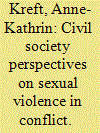

|
|
|
|
|
| Summary/Abstract |
In international policy circles, conflict-related sexual violence (CRSV) is commonly viewed as a weapon of war, a framing that researchers have criticized as overly simplistic. Feminist scholars in particular caution that the ‘weapon of war’ framing decontextualizes sexual violence in conflict from the structural factors of gender inequality that underpin its perpetration. In light of these tensions, how do politically relevant local actors perceive the nature and the origins of conflict-related sexual violence? Civil society organizations often actively confront conflict-related sexual violence on the ground. A better understanding of how their perceptions of this violence align or clash with the globally dominant ‘weapon of war’ narratives therefore has important policy implications. Interviews with representatives of Colombian women's organizations and victims' associations reveal that these civil society activists predominantly view conflict-related sexual violence as the result of patriarchal structures. The mobilized women perceive sexual violence as a very gendered violence that exists on a continuum extending through peace, the everyday and war, and which the presence of arms exacerbates. Strategic sexual violence, too, is understood to ultimately have its basis in patriarchal structures. The findings expose a disconnect between the globally dominant ‘weapon of war’ understanding that is decontextualized from structural factors and a local approach to CRSV that establishes clear linkages to societal gender inequality.
|
|
|
|
|
|
|
|
|
|
|
|
|
|
|
|
| 4 |
ID:
169887
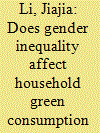

|
|
|
|
|
| Summary/Abstract |
In this paper, we examine whether gender inequality affects a household's decision to adopt green consumption behaviour in China. Building upon the literature that claims women tend to be more environmentally friendly than men, we hypothesise that households in which women play a stronger role adopt greener consumption lifestyles. Based on a nationwide survey, our empirical results show that households in counties with greater gender inequality use less energy-efficient electric products and are less willing to save energy. The results are robust to a number of variations in our empirical models. Social and economic factors are included to further explore the mechanisms underlying households' decisions. Our findings provide new insights into green development from a micro-level, bottom-up perspective. They are relevant for policy makers because they indicate that promoting gender equality can have a favourable impact on green development.
|
|
|
|
|
|
|
|
|
|
|
|
|
|
|
|
| 5 |
ID:
186191
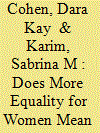

|
|
|
|
|
| Summary/Abstract |
Recent world events, such as the rise of hypermasculine authoritarian leaders, have shown the importance of both sex and gender for understanding international politics. However, quantitative researchers of conflict have long relegated the study of sex and gender inequality as a cause of war to a specialized group of scholars, despite overwhelming evidence that the connections are profound and consequential. In this review essay, we demonstrate the tremendous progress made in this field by analyzing a wave of research that examines the relationships between sex and gender inequality and war. We divide this work into theories that emphasize strategy versus those that analyze structures. In addition, we focus on two aspects of this research agenda—specifying mechanisms that link sex and gender inequality to war, and leveraging data at multiple levels of analysis—to outline fruitful pathways forward for the broader international security research agenda. Ultimately, we argue that the study of the nexus of sex and gender inequality and war will enliven theoretical debates, illuminate new hypotheses, and enrich the policy discourse with robust evidence.
|
|
|
|
|
|
|
|
|
|
|
|
|
|
|
|
| 6 |
ID:
118019
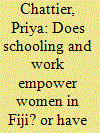

|
|
|
|
|
| Publication |
2013.
|
| Summary/Abstract |
The paper explores the limitations of the theoretical presumptions underlying the relationship between empowerment, education and employment that have been emphasized in both the existing literature and the current rhetoric to 'empower' women in developing countries. The research uses findings from in-depth interviews and focused group discussion data to empirically examine the relationship between schooling, paid work and empowerment of women in Fiji. The paper argues that the relationship between education, work and empowerment is conditioned by gender norms surrounding women's and men's choices on key economic decisions. The findings demonstrate that cultural norms about gender roles are considered to persist, generating gender inequality despite women's and girl's education and employment. Empirical evidence makes a strong case for the need to move away from broad-based conceptualizations of women's empowerment to an analysis of the social construction of gender as both a conceptual and an empirical category of inquiry.
|
|
|
|
|
|
|
|
|
|
|
|
|
|
|
|
| 7 |
ID:
116152
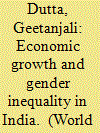

|
|
|
| 8 |
ID:
193004
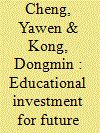

|
|
|
|
|
| Summary/Abstract |
Numerous studies have shown that a sex ratio imbalance (more boys than girls in a society) may result in a sequence of social problems. This study investigated the expected effect of a high sex ratio on educational investment. Using nationally representative data from the China Family Panel Studies and the 2010 Census, we determined the following: (i) a high sex ratio increased educational expenditure for boys relative to girls; (ii) parents who took education seriously and who cared about their children's education were more likely to invest in education to appear attractive in the future marriage market, and (iii) the profound impact of a high sex ratio on educational expenditure was more pronounced in less educated and poorer families. Our findings raised the possibility that the effect of the sex ratio may bring about more gender inequality in the future. The implicit cost of a high sex ratio may further lead to a vicious cycle of family fertility and childbearing.
|
|
|
|
|
|
|
|
|
|
|
|
|
|
|
|
| 9 |
ID:
159336
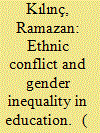

|
|
|
|
|
| Summary/Abstract |
Although conflict remains a major obstacle to development in many areas of the world, its impact on education has been rarely studied. This article investigates the relationship between conflict and gender equality, focusing on the schooling of the girls in the conflict-ridden regions of Turkey. Patriarchy is the most important determinant of low educational levels among girls in Southeastern Turkey. However, ethnic conflict exacerbates male-dominant traditions and blocks economic development, reinforcing patriarchal norms and limiting girls’ school attendance. Yet, by provoking political mobilization around a Kurdish identity, ethnic conflict may undermine patriarchy and unintentionally promote girls’ education.
|
|
|
|
|
|
|
|
|
|
|
|
|
|
|
|
| 10 |
ID:
159076
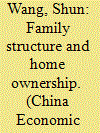

|
|
|
|
|
| Summary/Abstract |
This paper studies how individuals, particularly low-income individuals, have financed housing purchases since the housing market was privatized in urban China in the 1990s. To the surprise of many policy makers and economists, more than 80% of the households in urban China owned private housing by the end of 2010. In contrast to most developed countries, we find that male siblings are important borrowing resources to purchase housing. Conditional on the number of siblings, having more brothers instead of sisters increases the probability of owning housing among male individuals born during the baby boom (1949–1978) in urban China. However, there is no such brother effect for females. The brother effect is stronger for males with low income or low levels of education and is also stronger when brothers are wealthier. Our results are robust to different model specifications. Our results suggest that females are likely to be excluded from family-based informal financial market for housing purchase among baby boom generations in China.
|
|
|
|
|
|
|
|
|
|
|
|
|
|
|
|
| 11 |
ID:
124957
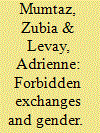

|
|
|
|
|
| Publication |
2013.
|
| Summary/Abstract |
A safe, consistent blood supply in Pakistan is critical in combating maternal deaths due to haemorrhage. The dominant form of blood donation in Pakistan is a directed-replacement system. Complex sociocultural values influence from whom a recipient can receive blood. This focused ethnography aimed to investigate if, in this patriarchal society, the gender of the recipient influences who will donate blood. Data were collected from the district of Rawalpindi/Islamabad, Jhelum and Layyah in 2009 and 2012. Findings revealed that gendered notions of blood and blood donation construct reproductive blood loss as less serious than other types of blood loss. Husbands almost universally removed themselves from the process of blood procurement for their wives in the midst of a maternal health emergency. This was due to a combination of gender norms and beliefs about the power of blood, akin to the power of breast milk, to connect husbands and wives in a donor-recipient relationship that would lead to the negation of the marital contract. The inherent gendered devaluation of the lives of women was evident in the manner in which blood was procured for child-birthing women. These complex beliefs indicate that the idealized Euro-American blood system could be ineffective in this context.
|
|
|
|
|
|
|
|
|
|
|
|
|
|
|
|
| 12 |
ID:
126520
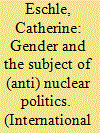

|
|
|
|
|
| Publication |
2013.
|
| Summary/Abstract |
This article aims to rehabilitate women campaigners against nuclear weapons as a focus of study and interlocutor for feminist International Relations scholars. Highlighting the recent tendency in gender and security studies to ignore or stereotype these campaigners, I first show how their critical re-investigation has been facilitated by recent systematizations of poststructuralist-influenced feminist methodology. In this light, I then revisit the discourses circulating in women's antinuclear activism in the 1980s before deconstructing in more detail the post-Cold War writings of Helen Caldicott and Angie Zelter. I argue that multiple, differently gendered constructions of the antinuclear campaigner were in play during the Cold War and have since been reconfigured in ways that reflect and reproduce the shift to a post-Cold War context and differences between the United States and UK. In such ways, then, women antinuclear campaigners continue to develop diverse oppositional subject positions in their efforts to challenge nuclear hegemony, in a discursive struggle worthy of attention from gender and security scholars as part of a broader, critical re-engagement with the gendered dimensions of nuclear politics.
|
|
|
|
|
|
|
|
|
|
|
|
|
|
|
|
| 13 |
ID:
131520


|
|
|
|
|
| Publication |
2014.
|
| Summary/Abstract |
When and why do women gain from increased descriptive representation in deliberating bodies? Using a large randomized experiment, and linking individual-level speech with assessments of speaker authority, we find that decision rules interact with the number of women in the group to shape the conversation dynamics and deliberative authority, an important form of influence. With majority rule and few women, women experience a negative balance of interruptions when speaking, and these women then lose influence in their own eyes and in others'. But when the group is assigned to unanimous rule, or when women are many, women experience a positive balance of interruptions, mitigating the deleterious effect of small numbers. Men do not experience this pattern. We draw implications for a type of representation that we call authoritative representation, and for democratic deliberation.
|
|
|
|
|
|
|
|
|
|
|
|
|
|
|
|
| 14 |
ID:
121129
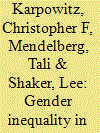

|
|
|
|
|
| Publication |
2012.
|
| Summary/Abstract |
Can men and women have equal levels of voice and authority in deliberation or does deliberation exacerbate gender inequality? Does increasing women's descriptive representation in deliberation increase their voice and authority? We answer these questions and move beyond the debate by hypothesizing that the group's gender composition interacts with its decision rule to exacerbate or erase the inequalities. We test this hypothesis and various alternatives, using experimental data with many groups and links between individuals' attitudes and speech. We find a substantial gender gap in voice and authority, but as hypothesized, it disappears under unanimous rule and few women, or under majority rule and many women. Deliberative design can avoid inequality by fitting institutional procedure to the social context of the situation.
|
|
|
|
|
|
|
|
|
|
|
|
|
|
|
|
| 15 |
ID:
178721
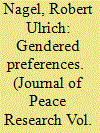

|
|
|
|
|
| Summary/Abstract |
To what extent do gender relations in society influence the likelihood of negotiations during intrastate disputes? A substantial body of literature recognizes gendered inequalities as integral to understanding conflict, yet they have received little attention in systematic studies of conflict management. I argue that patriarchal gender relations that reflect a preference for masculinity over femininity influence states’ propensity to negotiate with rebels. I draw on the concept of practices to explain how gender relations shape government preferences for negotiations. Specifically, I contend that practices of excluding women from fully participating in public life institutionalize violence as the preferred way of managing conflict. The implication is that countries with more patriarchal gender relations are less likely to engage in negotiations during intrastate conflicts. I test this argument on all civil conflict dyads between 1975 and 2014. The analyses show that countries that marginalize women’s participation in public life are significantly less likely to engage in negotiations. The results provide strong support for my theoretical argument and offer systematic evidence in support of core claims of the feminist peace theory.
|
|
|
|
|
|
|
|
|
|
|
|
|
|
|
|
| 16 |
ID:
189317
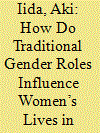

|
|
|
|
|
| Summary/Abstract |
In comparison to other countries in East Asia in which a significant gender gap can be identified, Taiwan is reported to have an exceptionally high level of gender equality. However, Taiwan’s fertility rate is notably low (1.05 in 2019), even among East Asian countries with declining fertility rates. Childbirth outside marriage is rare in Taiwan; hence, the marriage rate directly affects the number of newborn babies. This implies that Taiwan’s gender equality index does not properly reflect the actual situation in society and that the situation may not be so different from in other East Asian countries. Namely, invisible forms of gender inequality may exist in Taiwan, and traditional gender roles may affect women’s lives, including their willingness to start a family. To examine this proposition, semi-structured interviews were undertaken with 43 women aged 30–40 years old, with a focus on those with a basic university education or higher who are most likely to experience gender equality. Results show that Taiwanese women—especially highly educated women—enjoy superficially equal positions and avoid traditional contexts in order to protect their rights and avoid the gender roles associated with traditional families. Welfare that the state should be responsible for, such as childcare and nursing care, is supplied by women in the name of tradition, but the willingness of females to start a family is declining. Promoting family participation for males and supporting more comprehensive equality are two of the keys to increasing the marriage/fertility rate and closing the gap between public and private equality.
|
|
|
|
|
|
|
|
|
|
|
|
|
|
|
|
| 17 |
ID:
124973
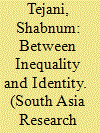

|
|
|
|
|
| Publication |
2013.
|
| Summary/Abstract |
Recent attention to the history of constitution-making in India reflects ongoing concerns about the difficulties and limitations of India's secular, democratic experiment. Scholars assessing India's secularism have pointed to the failure to separate the state from its involvement in religion from the outset. Through a study of the Constituent Assembly debates, this article suggests that the emphasis on 'religion' as the problem for secularism has been a distraction, taking the gaze away from the substantive arguments minorities were making about how their equal citizenship should be guaranteed. It remained unclear what recognition of 'minority' status was meant to achieve in postcolonial India and what it signified. In failing to recognise the claims of religious minorities for their equality, the Constituent Assembly reified their position as permanently unequal communities in the newly independent state.
|
|
|
|
|
|
|
|
|
|
|
|
|
|
|
|
| 18 |
ID:
126506
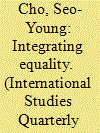

|
|
|
|
|
| Publication |
2013.
|
| Summary/Abstract |
This paper empirically investigates whether globalization can improve women's rights. Using panel data from 150 countries over the 1981-2008 period, I find that social globalization positively affects women's economic and social rights. When controlling for social globalization, however, economic globalization does not have any effect on women's rights. Despite the positive effect of (social) globalization on women's standing in a country, (marginalized) foreign women, proxied with inflows of human trafficking, are not beneficiaries of such "female-friendly" globalization effects.
|
|
|
|
|
|
|
|
|
|
|
|
|
|
|
|
| 19 |
ID:
187800
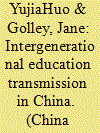

|
|
|
|
|
| Summary/Abstract |
This paper explores gender differences in intergenerational patterns of education attainment in China. Using the China Family Panel Studies (CFPS) survey for 2016, we find that intergenerational ‘persistence’, as reflected in high regression and correlation coefficients between an individual's and their parents' education levels, is higher for females than males for the entire sample and for each of four age cohorts. This result stems primarily from the relative lack of upward mobility among females from families with low levels of education, as confirmed by a series of educational mobility matrices and a multinomial logistic regression analysis. The results offer novel insights into gender differences in the unequal transmission of education across generations, with significant implications for gender inequality more broadly in Chinese society.
|
|
|
|
|
|
|
|
|
|
|
|
|
|
|
|
| 20 |
ID:
182800
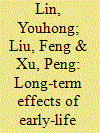

|
|
|
|
|
| Summary/Abstract |
This study evaluates the long-run effects of early-life exposure to tropical cyclones on the socioeconomic performance of individuals in China. We identify significantly negative effects of gestational typhoon exposure on the educational attainment and annual income in adulthood, which also exhibit a significant gender inequality favoring the male. Despite the small culling effects from pregnancy failure and infant mortality, gestational typhoon exposures increase the probability of having a younger sibling and shorten the subsequent birth interval. Typhoon damage to the health and economic abilities of adults, as well as the local economy indicates a channel of household economic status for the reduced long-run socioeconomic outcomes.
|
|
|
|
|
|
|
|
|
|
|
|
|
|
|
|
|
|
|
|
|